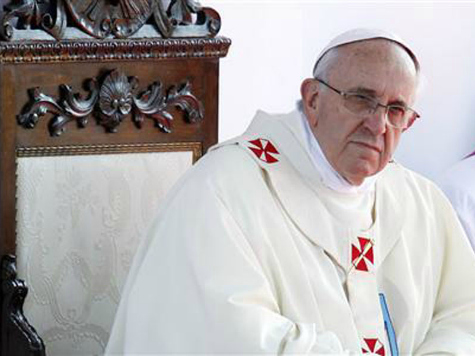“Impure Pope: Leave Our Country,” read one sign held up by a protester, former Israeli legislator Michael Ben Ari, objecting to Pope Francis’s visit to Israel this week. The Pope’s arrival–and use of certain holy locations–have sparked both a wave of protests and increased security concerns on the part of the Israeli government.
The Israeli military, The Wall Street Journal reports, has issued restraining orders against a number of activists they deem potentially dangerous, who are now barred from leaving their homes during the Papal visit. Concerns grew after protests earlier this month when Orthodox Jewish leaders objected to the Pope’s visit, and in particular to the use of the Cenacle, a site believed to have been the setting for Jesus’s Last Supper.
Over 200 Jewish protesters arrived at the site on May 12, objecting to its use, as it is believed to also be the tomb of King David. “Can we give control over the King David to a gentile?” asked a speaker at the rally, according to the Journal‘s account.
Another concern is the collective organized prayer by a Christian religion at a place many consider to be fine for individual, but not collective, prayer. Rabbi Yitzchak Goldstein of the Diaspora Yeshiva, a Jewish religious seminary near the Cenacle, told The Wall Street Journal that the objection to the Pope’s prayer there is that it elevates one religion as “superior above the other.”
Still, others harbor concerns that the Pope’s mission is not one of simple prayer, but of conversion. Rabbi Simcha Hacohen Kook articulated in an interview his highly inflammatory charge that “we have forgotten that the pope stood beside Hitler and murdered Jews,” adding that the use of the Cenacle would lead to “young people coming to watch the Christian Mass, instead of seeing King David and will cause a wave of conversion to Christianity.”
Pope Francis is expected to arrive in Jordan on Saturday, and he is traveling with both a Muslim and Jewish leader he befriended as archbishop of Buenos Aires. Rabbi Abraham Skorka explained that, during his time working with Pope Francis, they “shared [a] lot of experience,” stating, “We were in touch, one with the other, maintaining each one his own tradition but knowing that there exists another, that the other can be your friend, being other.”
Pope Francis has described his voyage as “purely religious,” not political, and in addition to stops in Israel will include a visit with Syrian civil war refugees and a large mass in Amman, Jordan.

COMMENTS
Please let us know if you're having issues with commenting.